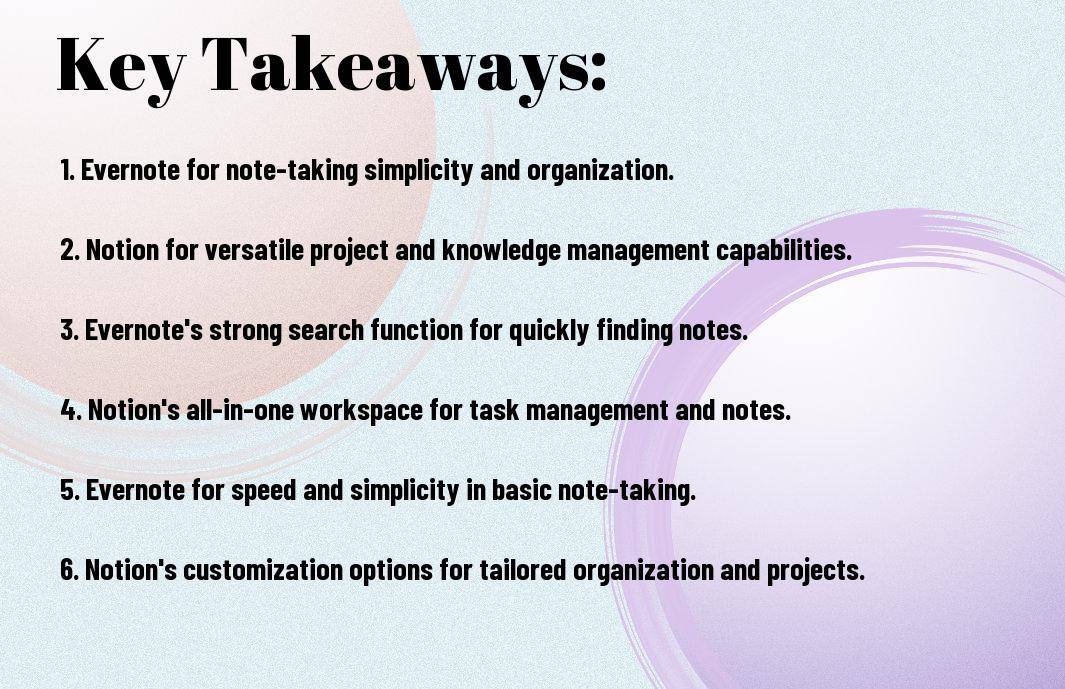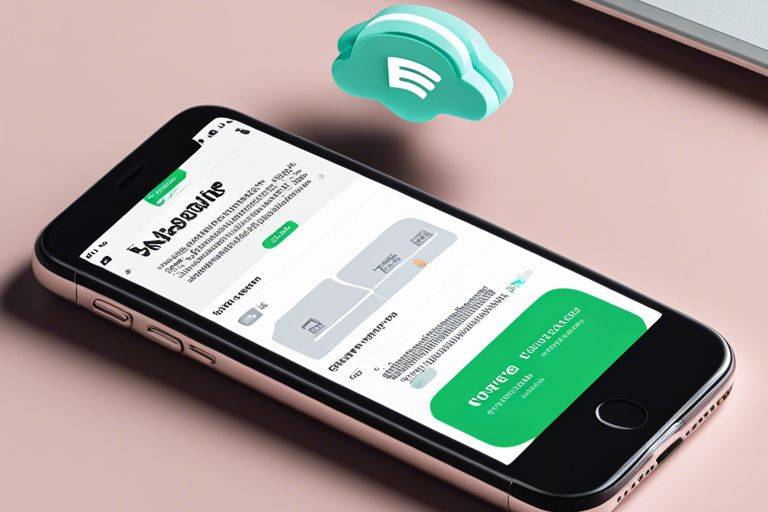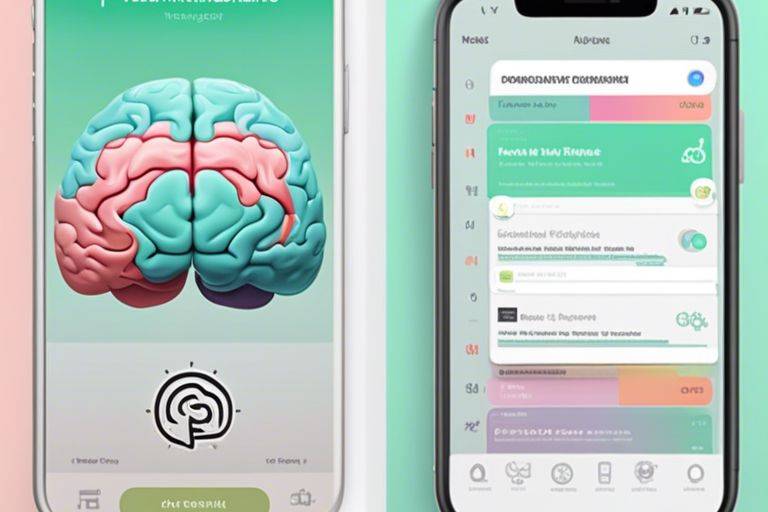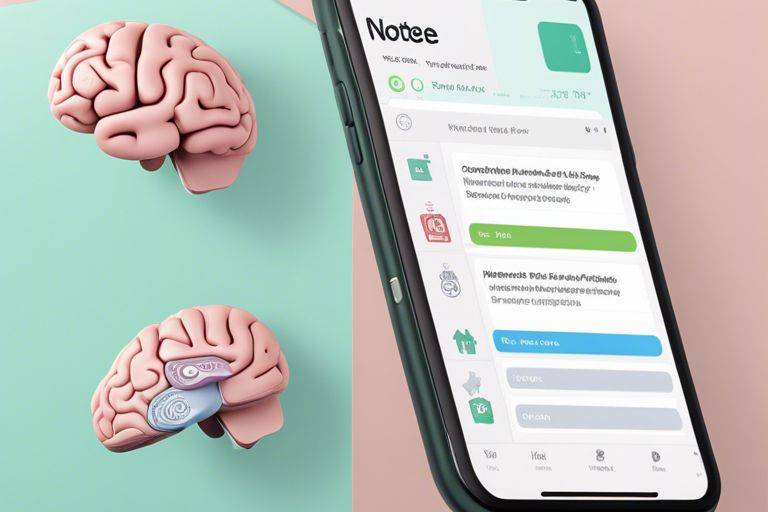Evernote vs Notion!: Notion and Evernote are two popular digital tools known for organizing and storing information, acting as a second brain for many users. Both have unique features that cater to different preferences and needs, making it challenging to choose the best one for your digital note-taking. In this blog post, we will compare Evernote and Notion based on their key features, usability, and versatility to help you decide which one is the perfect fit for your second brain needs.
Key Takeaways:
- Evernote: Best for note-taking and organizing with its user-friendly interface and powerful search capabilities.
- Notion: Ideal for creating a second brain as it offers a wide range of features, such as databases, calendars, and project management tools.
- Integration: Evernote excels in integrating with other apps and services, while Notion is a more all-in-one solution.
- Use case: Choose Evernote if you prioritize simplicity and efficiency in note-taking, and Notion for comprehensive organization and collaboration.
- Cost: Both Evernote and Notion offer free versions with limitations, but Notion provides more features in its free plan.
- Flexibility: Notion allows for more customization and creativity in organizing information, while Evernote is more structured and straightforward.
- Try both: Experiment with both tools to see which one better fits your workflow and meets your specific needs for a second brain.

Getting to Know Evernote
One Question: Evernote or Notion? : r/secondbrain
A Brief History of Evernote
An ever-evolving digital note-taking tool, Evernote has been a pioneer in personal productivity since its launch in 2008. Created by Stepan Pachikov, the initial concept was to provide a platform where users could capture ideas, organize thoughts, and store important information in a digital format. Over the years, Evernote has grown in popularity, attracting a diverse user base seeking a comprehensive solution for managing their digital lives.
Core Features of Evernote
Evernote, known for its versatility, offers a wide range of features designed to streamline the note-taking process and enhance organization. Users can create text notes, checklists, audio recordings, and even handwritten notes using the app. One notable feature is the ability to sync notes across multiple devices, ensuring that your information is always accessible. Additionally, Evernote provides powerful search functionality, allowing users to quickly locate specific notes or information within their vast collection.
Features: With support for web clipping, document scanning, and the ability to attach files, Evernote serves as a one-stop solution for consolidating all your digital content. The app also offers customizable notebooks and tags, making it easy to categorize and group related information. Furthermore, the collaboration features allow users to share notes and work together on projects, promoting productivity and teamwork.
Whether you’re a student looking to organize study materials, a professional managing work projects, or a creative individual capturing inspiration, Evernote offers a versatile platform to support your second brain needs.
Introducing Notion
The Rise of Notion
On a quest to find the perfect tool for organizing your thoughts, tasks, and ideas? Look no further than Notion. In recent years, Notion has gained immense popularity among professionals, students, and creatives alike for its versatility and user-friendly interface.
With its sleek design and powerful features, Notion has emerged as a strong contender in note-taking and productivity apps. It offers a unique blend of flexibility and functionality, making it a valuable tool for anyone looking to streamline their digital workspace.
Key Features of Notion
The number of features Notion offers can be overwhelming at first, but each one serves a specific purpose to enhance your productivity and organization. Here are some key features that set Notion apart:
- Customizable Templates: Easily create and customize templates for different projects and tasks.
- Database Management: Organize information using databases, tables, and lists.
- Collaboration Tools: Work with teams in real-time and share knowledge effortlessly.
The flexibility and versatility of Notion make it a one-stop solution for all your digital organization needs. Whether you’re a student, professional, or creative, Notion adapts to your unique workflow and preferences, perceiving as your second brain.
For instance
The ability to seamlessly switch between views, such as list, kanban, and calendar, offers a versatile approach to organizing your information. Furthermore, the integration of databases with linked pages allows for a dynamic and connected way to manage your content.
User Interface and Experience
Navigating Evernote’s Layout
Interface All Using Notion as Your Second Brain the layout of Evernote is designed with simplicity in mind, making it easy for users to quickly navigate and find their notes. The sidebar provides access to different notebooks, tags, and saved searches, allowing for seamless organization and retrieval of information. The clean and straightforward interface of Evernote appeals to users who prefer a more traditional note-taking experience without any distractions.
Exploring Notion’s Design
User Interface And Experience In contrast, Notion offers a more visually appealing and customizable design. Users can create different pages, databases, and templates to suit their specific needs, providing a more flexible and creative approach to organizing information. The ability to toggle between different views, such as board, list, and calendar, enhances the user experience and allows for more dynamic and interactive note-taking.
Navigating the interface of Notion may initially seem overwhelming due to its extensive features and customization options, but users can easily personalize their workspace to create a personalized second brain. The collaborative nature of Notion makes it a powerful tool for both individual and team use, with the potential to streamline workflows and enhance productivity.
Note-Taking and Organization Capabilities
Once again, if you’re delving into the world of second brain apps and looking for the best tool for your needs, you might want to check out the 10 Best Second Brain Apps for Note-Taking in 2024 for a comprehensive list of options.
Evernote’s Approach to Note-Taking
For many users, Evernote has been a long-standing favorite when it comes to note-taking. Its approach is centered around simplicity and efficiency, allowing users to jot down ideas, clip web articles, create to-do lists, and even scan documents seamlessly. The platform’s robust organizational capabilities, such as notebooks, tags, and search functionality, make finding and revisiting notes a breeze.
Notion’s Organization and Note-Taking Features
NoteTaking For those who prefer a more versatile approach to note-taking and organization, Notion stands out with its comprehensive set of features. Notion combines traditional note-taking with databases, spreadsheets, and kanban boards, offering users a highly customizable workspace. With the ability to create linked databases, templates, and embed multimedia content, Notion is a powerhouse for organizing information in a structured yet visually appealing way.
Approach Notion’s all-in-one approach may seem overwhelming at first, but once users grasp its flexibility, the possibilities become endless. Whether you’re managing a project, planning your week, or building a knowledge base, Notion adapts to your workflow, making it a top choice for those looking to consolidate their digital clutter into a functional and aesthetically pleasing system.

Integration and Compatibility
How Evernote Plays with Other Apps
Your Evernote experience can get even better when you integrate it with other apps to streamline your workflow. Evernote integrates seamlessly with popular apps like Google Drive, Slack, and Microsoft Teams, allowing you to easily attach files, share notes, and collaborate with team members. This compatibility ensures that your second brain is interconnected with all your important tools, so you can stay organized and productive.
Notion’s Integration with External Tools
The Notion platform also offers robust integration with external tools, enabling you to create a comprehensive workspace that meets all your needs. Notion supports integration with platforms such as Trello, GitHub, and Figma, providing a versatile environment for managing projects, tracking workflows, and designing visuals. The flexibility of Notion’s integration capabilities allows you to tailor your second brain to suit your specific requirements.
For instance, integrating Notion with Trello can enhance your project management by combining Trello’s task-based approach with Notion’s robust organizational features. This fusion creates a powerful system that centralizes your tasks, deadlines, and project updates in one cohesive workspace.
Pricing and Plans
Understanding Evernote’s Pricing Model
Many individuals and professionals rely on Evernote as their go-to tool for organizing thoughts, ideas, and tasks. In the context of pricing, Evernote offers a free basic version with limited features, making it suitable for casual users. For those seeking more robust features like offline access, additional storage, and greater collaboration options, Evernote offers two paid plans: Evernote Premium and Evernote Business.
Evernote Premium comes with enhanced organization features, larger storage limits, and the ability to access notes offline. On the other hand, Evernote Business is designed for teams, offering collaborative features like sharing notebooks, permissions settings, and team activity history. It’s important to note that Evernote’s pricing model is on a subscription basis, with options for monthly or annual payments.
Notion’s Payment Options
Any individual or team looking for a versatile tool to manage projects, databases, and notes might consider Notion as an alternative to Evernote. Notion’s pricing model is unique in that it offers a free personal plan with generous features, making it a popular choice for solo users. For users who require more advanced functionalities like enhanced collaboration tools and increased file upload limits, Notion offers a paid Team plan.
This Team plan includes features such as unlimited guests, advanced permissions, and priority support. What stands out about Notion’s payment options is the flexibility to choose between monthly or annual billing cycles, suiting different budget preferences.
Pros and Cons: A Comparative Analysis
For a comprehensive review of Evernote and Notion, it is crucial to examine their pros and cons side by side. This will help you determine which tool aligns best with your needs and preferences.
Advantages of Using Evernote
The Versatility of Evernote
The flexibility and ease of use of Evernote make it a popular choice among users. It allows for seamless note-taking, organizing, and syncing across multiple devices, making it a valuable tool for both personal and professional use.
The Drawbacks of Evernote
Cons of Evernote
One of the main drawbacks of Evernote is its limited formatting options, especially when compared to other note-taking tools. This can make it challenging to create visually appealing and organized notes, which may be a concern for users who prioritize aesthetics.
Understanding The Drawbacks of Evernote: While Evernote is known for its user-friendly interface and robust features, some users may find its pricing plans to be on the higher side compared to other similar tools in the market. This can be a deterrent for budget-conscious individuals or those looking for more cost-effective solutions.
The Benefits of Choosing Notion
Analysis of Notion’s Benefits
Notion stands out for its extensive customization options and the ability to create diverse types of content within the same workspace. This makes it a versatile tool for organizing projects, taking notes, managing tasks, and collaborating with team members.
Notion: One distinct advantage of Notion is its all-in-one approach, combining the functionalities of several tools into a single platform. This can streamline your workflow and reduce the need to switch between multiple applications, enhancing productivity and efficiency.
Limitations of Notion
One Limitation of Notion
One limitation of Notion is the learning curve associated with mastering its various features and functions. New users may find it overwhelming initially, requiring time and effort to explore and understand the full capabilities of the platform.
Comparative: When comparing Evernote and Notion, it is necessary to consider your specific requirements and preferences. While Evernote excels in simplicity and accessibility, Notion offers a more comprehensive and customizable approach to personal knowledge management. Ultimately, the choice between the two will depend on your individual needs and how you prefer to organize and access information in your digital workspace.
Tips for Optimizing Your “Second Brain”
Now let’s probe into some helpful tips for optimizing your digital second brain, whether you use Evernote or Notion. These practices can enhance your productivity, organization, and overall experience with these powerful tools.
Best Practices for Evernote Users
Users of Evernote can maximize their experience by utilizing tags effectively to categorize and easily locate notes. Creating a consistent naming convention for tags can streamline the organization process, allowing for seamless searching and filtering. Additionally, leveraging Evernote’s notebook stacking feature can help maintain a structured hierarchy for your notes.
Assume that incorporating shortcuts for frequently used actions can save you valuable time and simplify your workflow in Evernote. By customizing these shortcuts based on your most common tasks, you can navigate the app more efficiently and boost your productivity.
Maximizing Efficiency with Notion
With Notion, users can optimize their “second brain” by creating templates for recurring note formats or projects. This feature can expedite the note-taking process and ensure consistency across your workspace. Furthermore, utilizing relational databases in Notion can establish meaningful connections between different pieces of information, allowing for a more holistic view of your data.
A key advantage of Notion is its versatile database properties, including text, number, select, and more. Users can leverage these properties to customize their databases according to specific needs, providing a tailored experience for organizing and analyzing information efficiently.

To wrap up
Drawing together all the points discussed, both Evernote and Notion have their unique strengths and are powerful tools for managing your second brain. Evernote is known for its simplicity and efficiency in note-taking, while Notion offers a more versatile platform with customizable features for organization and collaboration.
Ultimately, the choice between Evernote and Notion comes down to personal preference and the specific needs of the user. It’s worth exploring both options to see which tool aligns best with your workflow and helps you optimize your productivity. Whichever tool you choose, integrating it effectively into your daily routine can transform the way you capture, organize, and retrieve information, enhancing your overall productivity and creativity.
FAQ
Q: What is Evernote?
A: Evernote is a note-taking application that allows users to capture ideas, organize thoughts, and collaborate with others.
Q: What is Notion?
A: Notion is an all-in-one workspace that combines note-taking, project management, and task management features in one platform.
Q: What are the key differences between Evernote and Notion?
A: Evernote is primarily focused on note-taking and organization, while Notion offers a more comprehensive suite of tools for project management, task tracking, and collaboration.
Q: Which tool is better for organizing personal notes and ideas?
A: If you’re looking for a simple and intuitive tool for organizing personal notes and ideas, Evernote may be the better option for you.
Q: Which tool is better for team collaboration and project management?
A: Notion is more suitable for team collaboration and project management, thanks to its versatile features and customizable workspace.
Q: Can I import my notes from Evernote to Notion?
A: Yes, you can import your notes from Evernote to Notion using the built-in import feature in Notion.
Q: Are there any pricing differences between Evernote and Notion?
A: Evernote offers a freemium model with limited features in the free version, while Notion provides a free plan with basic functionalities and paid plans for advanced features.



